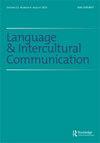重新审视“外来性”:民族主义与语言教育
IF 2.2
1区 文学
0 LANGUAGE & LINGUISTICS
引用次数: 1
摘要
摘要尽管语言教育的理想定位是帮助学生对语言、文化、国家/地区和身份形成细致入微的理解,但这些概念在实践中经常被混淆(例如,Reagan和Osborn,2021)。这可能会导致对所学语言使用者的其他描述(例如Osborn,2021;Palfreyman,2005),并使某些语言使用失去合法性。我们分享了一项研究的初步结果,在该研究中,采用批判性方法的语言教育工作者,如社会正义教学(Osborn,2006)或跨文化公民身份教学(Byram,2008),在实践中解决了这些问题,并讨论了破坏有害做法的方法。本文章由计算机程序翻译,如有差异,请以英文原文为准。
Revisiting ‘foreignness’: Nationalism and language education
ABSTRACT Although language education should be ideally positioned to help students develop a nuanced understanding of languages, cultures, nations/countries, and identities these concepts have often been conflated in practice (see, e.g. Reagan & Osborn, 2021). This can result in othering in depictions of speakers of the language being learned (e.g. Osborn, 2021; Palfreyman, 2005) and delegitimizing certain language use(r)s. We share preliminary results from a study in which language educators who adopted critical approaches, such as teaching for social justice (Osborn, 2006) or intercultural citizenship (Byram, 2008, have addressed these questions in practice and discuss ways to disrupt harmful practices.
求助全文
通过发布文献求助,成功后即可免费获取论文全文。
去求助
来源期刊

Language and Intercultural Communication
Multiple-
CiteScore
3.00
自引率
47.40%
发文量
50
期刊介绍:
Language & Intercultural Communication promotes an interdisciplinary understanding of the interplay between language and intercultural communication. It therefore welcomes research into intercultural communication, particularly where it explores the importance of linguistic aspects; and research into language, especially the learning of foreign languages, where it explores the importance of intercultural perspectives. The journal is alert to the implications for education, especially higher education, and for language learning and teaching. It is also receptive to research on the frontiers between languages and cultures, and on the implications of linguistic and intercultural issues for the world of work.
 求助内容:
求助内容: 应助结果提醒方式:
应助结果提醒方式:


